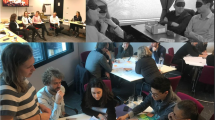Abstract
Policy education needs innovative pedagogies to facilitate learning of soft and hard skills required to tackle wicked problems of the twenty-first century. As experiential learning is increasingly found useful, we observe a shift from lecture-based teaching to engagement of active learning tools in the classroom. This change enables the use of games and simulations as alternative teaching tools for enhancing learning of concepts and skills useful for a collaborative and adaptive response to real-world problems.
This chapter puts forward a six-step pedagogical strategy for facilitating experiential learning of students about complexity of disaster risk and vulnerability, apply systems perspective and unpack nuances of adaptive governance.
This pedagogical strategy and analytical framework to evaluate students’ learning can also be used to design rubric for teaching in similar multi-and inter-disciplinary modules where games are used to acknowledge plurality, integrate knowledge and reflect on real-world policy issues.
Access this chapter
Tax calculation will be finalised at checkout
Purchases are for personal use only
Similar content being viewed by others
Notes
- 1.
The pedagogical steps are not part of the game but designed by the authors. The game is played with students of RC4 since AY 17–18 but the use of samples of previous students’ work was added in AY 19–20. An official peer-review report for this module helped the first author to make this modification.
- 2.
Testimonial from students’ feedback report—“… He made the module less overwhelming with the Forest Risk game where we learnt to apply our skills which were slightly stressful because of the unknown, but we learnt a lot through applying it in the final project.”
References
Battersby, Stephen. “Can humankind escape the tragedy of commons?” PNAS. News Feature (2017).
Cunico, Giovanni, Erini Aivazidou, and Edoardo Mollona. “System dynamics gamification: A proposal for shared principles.” Systems Research and Behavioral Science (2021): 1–11.
Folke, Carl, Thomas Hahn, Per Olsson, and Jon Norberg. “Adaptive governance of social-ecological systems.” Annu. Rev. Environ. Resour. 30 (2005): 441‒473.
Gallopín, Gilberto C. “Linkages between vulnerability, resilience, and adaptive capacity.” Global environmental change 16, no. 3 (2006): 293‒303.
Gouveia, David, Duarte Lopes, and Carlos Vaz De Carvalho. “Serious gaming for experiential learning.” In Frontiers in Education Conference (FIE), pp. T2G-1. IEEE, (2011).
Hmelo-Silver, Cindy E. “Problem-based learning: What and how do students learn?.” Educational psychology review 16, no. 3 (2004): 235‒266.
Holling, Crawford S., and Lance H. Gunderson. “Resilience and adaptive cycles.” In: Panarchy: Understanding Transformations in Human and Natural Systems, 25–62 (2002).
Kolb, Alice Y., and David A Kolb. “The Kolb learning style inventory 4.0: A comprehensive guide to the theory, psychometrics, research on validity and educational applications.” Philadelphia, PA: Hay Group (2013).
Kumilen A C de Almeida, and Coughlan P. Wicked problems and how to solve them. The Conversation. (2018). Accessed online from: https://theconversation.com/wicked-problems-and-how-to-solve-them-100047
Liu, Wei, Piotr Magnuszewski, Yidan Yang, and Nan Chen. “Navigating Conservation-Development-Disaster Complexities in Social-Ecological Systems Using Role-play Serious Gaming.” (2017).
Marcela, Brugnach, Art Dewulf, Claudia Pahl Wost, and Tharsi Taillieu. “Toward a Relational Concept of Uncertainty: about Knowing Too Little, Knowing Too Differently, and Accepting Not to Know.” Ecology and Society. 13, no. 2 (2008).
Mathews, Leah G., and Andrew Jones. “Using systems thinking to improve interdisciplinary learning outcomes: Reflections of a pilot study in land economics.” Issues in Integrative Studies. 26 (2008): 73–104.
Meadows, Donella H. Thinking in systems: A primer. Chelsea Green Publishing, (2008).
Miettinen, Reijo. “The concept of experiential learning and John Dewey’s theory of reflective thought and action.” International journal of lifelong education 19, no. 1 (2000): 54‒72.
Mochizuki, Junko, Piotr Magnuszewski, Michal Pajak, Karolina Krolikowska, Lukasz Jarzabek, and Michalina Kulakowska. “Simulation games as a catalyst for social learning: The case of the water-food-energy nexus game.” Global Environmental Change 66 (2021): 102204. https://doi.org/10.1016/j.gloenvcha.2020.102204
Nicolaides, Aliki and David C. McCallum. “Inquiry in action for leadership in turbulent times: Exploring the connections between transformative learning and adaptive leadership”. Journal of Transformative Education 11, no. 4 (2013): 246–260.
Ostrom, Elinor. “A diagnostic approach for going beyond panacea.”. PNAS 104, no. 39 (2007): 15181–15187.
Pahl-Wostl, Claudia, Jan Sendzimir, Paul Jeffrey, Jeoren Aerts, Ger Berkamp, and Katherine Cross. “Managing change toward adaptive water management through social learning.” Ecology and Society. 12, no. 2 (2007): 30.
Procee, Henk. “Reflection in education: A Kantian epistemology.” Educational theory 56, no. 3 (2006): 237‒253.
Solinska-Nowak, Aleksandra, Piotr Magnuszewski, Margot Curl, Adam French, Adriana Keating, Junko Mochizuki, Wei Liu, Reinhard Mechler, Michalina Kulakowska, and Lukasz Jarzabek. “An overview of serious games for disaster risk management–Prospects and limitations for informing actions to arrest increasing risk.” International journal of disaster risk reduction 31 (2018): 1013‒1029.
Sterman, J. D. “Business Dynamics. Systems thinking and modeling for a complex world.” McGraw-Hill, Boston, (2000): 982.
Tasantab, Jerry C, Gajendran Thyaparan, Owi Toinpre, and Raju Emmanuel. “Simulation-based learning in tertiary-level disaster risk management education: A class-room experiment.” International Journal of Disaster Resilience in the Built Environment (2021).
Acknowledgements
This chapter is part of the project “Measuring Learning Outcomes of University Town College Programme (UTCP) in Residential College 4 (RC4): Examining the Constructively Aligned Living-Learning Environments”, which is supported by “Teaching Enhancement Grant” (TEG) from Centre for Development of Teaching and Learning (CDTL), National University of Singapore (NUS)”. The authors are thankful to all the students of academic year 19–20 of the NUS-RC4 module Thinking in systems: Disaster resilience for their consent to use data from their assignments.
Author information
Authors and Affiliations
Corresponding author
Editor information
Editors and Affiliations
Rights and permissions
Copyright information
© 2022 The Author(s), under exclusive license to Springer Nature Singapore Pte Ltd.
About this chapter
Cite this chapter
Varma, N., Liu, W. (2022). Potential of a Serious game in Teaching and Learning of Systems Thinking and System Dynamics in a Multi-disciplinary Classroom. In: Nair, S., Varma, N. (eds) Emerging Pedagogies for Policy Education. Palgrave Macmillan, Singapore. https://doi.org/10.1007/978-981-16-5864-8_9
Download citation
DOI: https://doi.org/10.1007/978-981-16-5864-8_9
Published:
Publisher Name: Palgrave Macmillan, Singapore
Print ISBN: 978-981-16-5863-1
Online ISBN: 978-981-16-5864-8
eBook Packages: Political Science and International StudiesPolitical Science and International Studies (R0)




